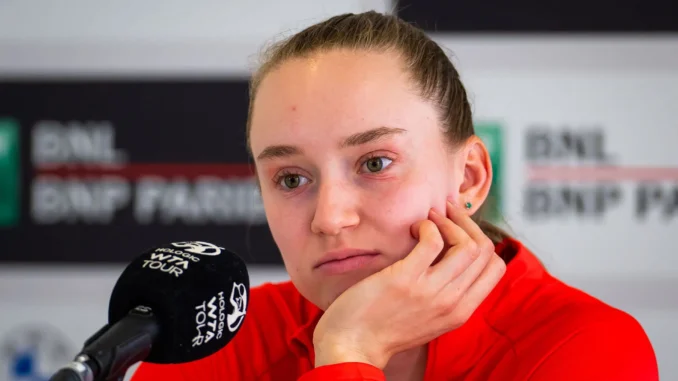
In the high-stakes world of professional tennis, where every serve and volley carries the weight of a player’s dreams, Elena Rybakina has carved out a reputation as one of the sport’s most formidable talents. The Kazakhstani star, who claimed the Wimbledon crown in 2022, recently opened up about the unseen struggles that accompany her success, shedding light on how her own lofty expectations have sometimes cast a shadow over her achievements. As she prepares for the clay courts of the Charleston Open in early April 2025, her candid reflections offer a glimpse into the mind of a champion grappling with the pressures she places on herself.
Rybakina’s journey to the top has been nothing short of remarkable. Born in Moscow and later switching her allegiance to Kazakhstan in 2018, she burst onto the global stage with a stunning Wimbledon victory at just 23 years old. That triumph, her first Grand Slam title, propelled her into the elite ranks of the WTA Tour, where she now sits comfortably among the top five players in the world. Yet, beneath the accolades and the powerful serves lies a quieter battle—one fought not against opponents across the net, but within the confines of her own mind. “After Wimbledon, I put a lot of pressure on myself,” she confessed in a recent interview, her voice tinged with the honesty that has become a hallmark of her off-court demeanor. “It was more about my own expectations than what others thought of me.”
This admission comes as Rybakina reflects on the seasons following her breakthrough. The 2022 Wimbledon win was a defining moment, a crowning achievement that transformed her from a promising talent into a household name. But with that success came a new burden: the expectation to replicate it, to prove it wasn’t a fluke. For Rybakina, whose stoic presence on the court often masks the intensity of her inner drive, those self-imposed standards proved more daunting than the roar of the crowd or the scrutiny of the tennis world. “You want to keep that level, to keep winning,” she explained, “and when you don’t, it’s tough to handle—not because of what people say, but because of what you demand from yourself.”
The past year has tested her resilience. Despite a strong start to 2025, with semifinal runs in Abu Dhabi and a competitive showing at the Australian Open, Rybakina has faced setbacks that have forced her to confront these internal pressures head-on. An early exit in Dubai and a surprising first-round loss to Ashlyn Krueger at the Miami Open in March—where she’d reached the final in the previous two years—stung deeply. Each defeat, she admitted, amplified the voice of self-doubt, making her question her preparation, her focus, and even her passion for the game she’s played since childhood. “Sometimes it’s hard to stay positive,” she said, her words carrying the weight of someone who’s spent hours dissecting her own performance. “You start to feel like you’re not doing enough, even when you know you’ve given everything.”
Yet Rybakina’s story isn’t one of despair—it’s one of growth. She’s quick to highlight the importance of her support system in navigating these turbulent waters. “This is where it’s key who you surround yourself with,” she noted, emphasizing the role of her team in keeping her grounded. After a tumultuous 2024, marked by a split with longtime coach Stefano Vukov amid controversy and a brief stint with Goran Ivanisevic that ended in early 2025, she’s now working with Italian coach Davide Sanguinetti. The transition hasn’t been seamless—her reunion with Vukov earlier this year, despite his WTA suspension for alleged code-of-conduct violations, stirred drama—but Rybakina remains focused on moving forward. “You need some kind of support,” she said, “people who can pull you out of that negative space and remind you what you’re capable of.”
On the court, Rybakina’s game remains a force to be reckoned with. Her blistering serve, often clocking speeds that leave opponents flat-footed, and her ability to dictate rallies with precision have kept her in the upper echelon of the sport. But it’s her mental evolution that she’s working to refine as the clay season looms. Charleston, with its slower surfaces and demanding conditions, will be a proving ground—not just for her physical skills, but for her ability to quiet the inner critic that’s haunted her since Wimbledon. “I’m learning to balance it,” she said of her expectations, “to enjoy the process more and not just focus on the result.”
As Rybakina steps onto the clay, she carries more than just a racket—she carries the lessons of a champion who’s faced her own high standards and emerged stronger. Her honesty about the negative impact of self-pressure resonates beyond tennis, offering a universal truth: even the best among us wrestle with doubt. For now, she’s determined to channel that energy into her next swing, her next match, her next chance to prove—to herself most of all—that she’s still the player who conquered Wimbledon and the one who can conquer whatever comes next.
Leave a Reply